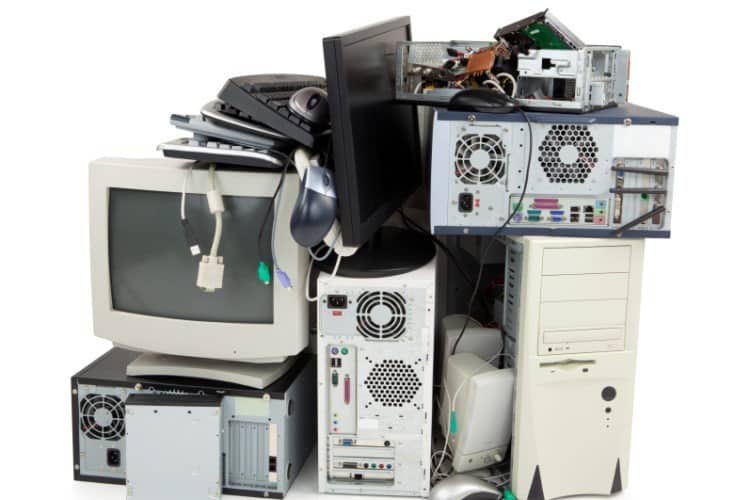Transforming E-Waste: Computer Recycling Done Right
Lasting IT Solutions: Trustworthy Computer Recycling Solutions
In light of this, the need for credible computer recycling solutions has actually never ever been more extremely important. In this conversation, we will certainly explore the ecological impact of e-waste, the advantages of responsible computer recycling, how to select a reliable recycling service, the recycling process for computers and digital gadgets, and the role of government laws in e-waste management.
The Environmental Impact of E-Waste
The incorrect disposal of digital waste, typically understood as e-waste, has significant environmental effects. E-waste refers to discarded digital tools such as computers, televisions, and smartphones (computer recycling). These devices consist of hazardous materials such as lead, mercury, cadmium, and brominated flame retardants, which can be dangerous to both human health and the atmosphere if not correctly handled
When e-waste is incorrectly taken care of, it often winds up in garbage dumps or is incinerated, releasing toxic compounds into the water, air, and dirt. The release of these harmful products can contaminate groundwater, pollute the air, and add to soil deterioration, posing serious wellness risks to neighboring communities and ecosystems.
Moreover, the incorrect disposal of e-waste also adds to the depletion of natural deposits. computer recycling. If effectively reused, many electronic devices include beneficial metals like gold, silver, and copper that can be recovered and recycled. When e-waste is not reused, these useful sources are lost, and the demand for brand-new raw products increases, leading to enhanced mining tasks and more environmental deterioration.
To minimize the environmental influence of e-waste, appropriate recycling and disposal methods need to be utilized. This includes the liable collection, taking apart, and recycling of digital tools to recover valuable materials and make certain the safe management of unsafe materials. Implementing effective e-waste management methods is vital to secure the environment, conserve sources, and promote a lasting future.

Advantages of Liable Computer System Recycling
Appropriately recycling computer systems uses a wide variety of advantages, consisting of ecological preservation and resource preservation. Accountable computer reusing not only helps protect against electronic waste from finishing up in land fills, yet it also reduces the demand for raw products and energy in the production of new tools.
One of one of the most considerable benefits of accountable computer recycling is the conservation of the atmosphere. When electronic waste is incorrectly thrown away, it can launch dangerous compounds such as lead, mercury, and cadmium into the dirt and water, posturing a risk to ecosystems and human wellness. By reusing computers, these unsafe materials can be securely removed and thrown away, reducing the threat of air pollution.
An additional advantage is resource conservation. Computer systems consist of beneficial products like gold, aluminum, copper, and silver, which can be recuperated and recycled via recycling procedures. By removing and reusing these products, the demand for mining brand-new sources is lowered, preserving natural deposits and reducing the ecological effect of source removal.
Additionally, accountable computer system recycling aids to decrease power intake. Production new computers needs a considerable quantity of power, from the removal of raw materials to the setting up procedure. By reusing computers and recycling their parts, the energy-intensive production process can be stayed clear of, resulting in a reduction in greenhouse gas discharges and a much more lasting usage of power sources.
Exactly How to Pick a Trustworthy Computer System Recycling Solution
When picking a computer reusing service, it is vital to think about a couple of crucial elements to make certain that you select a trustworthy and trustworthy provider. Firstly, it is important to confirm if the recycling solution adheres to appropriate environmental policies and methods. A reputable provider will certainly have accreditations and accreditations that demonstrate their commitment to liable recycling. Search for certifications such as R2 (Liable Recycling) or e-Stewards, which guarantee that the recycling process meets strict requirements for environmental management and information safety and security. Second of all, inspect if the solution uses secure information destruction. Information safety and security is a vital concern when reusing computers, as sensitive information saved on old devices can be at risk to theft or abuse. A credible recycling service should have safe information damage methods in place, such as information wiping or physical damage of storage space devices. Furthermore, take into consideration the service's performance history and reputation. Search for evaluations or testimonies from previous customers to evaluate their level of customer contentment and reliability. Finally, consider the service's openness and responsibility. A credible view it now provider needs to have the ability to offer comprehensive info regarding their recycling process, including how they manage dangerous products and ensure proper disposal. By taking into consideration these factors, you can pick a computer system reusing service that is honest, trusted, and environmentally responsible.
The Recycling Refine for Computer Systems and Digital Devices
To guarantee responsible disposal and reduce ecological effect, understanding the reusing process for computers and digital gadgets is crucial when picking a credible recycling service. The reusing process for these tools usually involves numerous stages.
First of all, the gadgets are collected from people, companies, or drop-off factors. This collection process might include transport logistics and protected handling to secure the sensitive data had within the gadgets. As soon as gathered, the tools are arranged based upon their type, such as smart devices, desktops, or laptops.
After arranging, the tools undertake a complete data damage procedure to ensure that any type of sensitive or individual information is permanently gotten rid of. This step is crucial to safeguard the personal privacy and security of companies and people. Information destruction techniques may consist of cleaning, degaussing, or physical devastation of the storage media.
Next, the devices are taken apart right into their specific parts. This enables the splitting up of different materials, such as plastics, metals, and motherboard. These materials are after that sent out to specialized reusing centers for more handling.
The recycling centers utilize different techniques to extract useful products from the electronic waste. These products can be recycled or repurposed in the production of brand-new products. The remaining waste is thrown away in an ecologically liable manner, adhering to regulatory guidelines.
The Role of Government Rules in E-Waste Management
Government regulations play a vital function in the reliable management of e-waste. With the constant development of the electronic devices sector and the raising concern for ecological sustainability, the requirement for correct disposal and recycling of digital waste has ended up being much more evident. Federal government laws assist to make sure that e-waste is taken care of in a responsible and lasting fashion.
Among the primary roles of government regulations is to establish standards and guidelines for e-waste monitoring. These guidelines define the correct approaches for collection, transportation, and recycling of electronic waste. By developing these criteria, governments can guarantee that e-waste is taken care of in a manner that lessens its influence on the environment and human health and wellness.
This consists of implementing take-back programs, where makers are liable for gathering and reusing electronic waste from customers. These policies help to change the burden of e-waste monitoring from the individual consumer to the industry, guaranteeing that electronic waste is handled in a much more sustainable manner.

Final Thought
In conclusion, it is critical to take into consideration the environmental impact of e-waste and choose a credible computer recycling service her latest blog to responsibly dispose of electronic gadgets. By complying with federal government policies and participating in appropriate reusing procedures, we can alleviate the unfavorable results of e-waste on the setting and promote a more lasting future.
In this conversation, we will certainly discover the ecological impact of e-waste, the advantages of accountable computer system recycling, how to select a credible recycling solution, the reusing procedure for computers and digital devices, and the duty of federal government regulations in e-waste monitoring. Computers have useful products like gold, copper, silver, and light weight aluminum, which can be recuperated and reused via recycling processes.Furthermore, liable computer reusing helps to reduce power intake. Information safety is an important concern when recycling computers, as delicate info kept on old devices can be at risk to theft or abuse. By thinking about these factors, you can pick a computer reusing service that is moral, trustworthy, and environmentally liable.